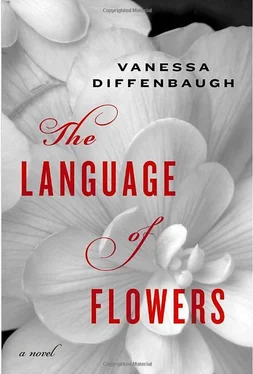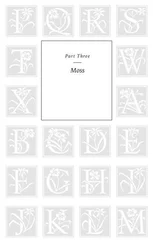Renata and Iworked most of the morning in silence. Bloom had a tiny storefront with a bigger work space in back, a long wooden table, and a walk-in refrigerator. There were six chairs around the table. I chose the one closest to the door.
Renata placed a book in front of me, titled Sunflower Weddings . I thought of an appropriate subtitle: How to Begin a Marriage Steeped in the Values of Deceit and Materialism . Ignoring the book, I created sixteen matching table arrangements with the sunflowers, lilies, and a tangle of wispy asparagus fern. Renata worked on the bridal-party bouquets, and when she finished those, she began a floral sculpture in a corrugated metal bucket longer than her legs. Every time the front door squeaked open, Renata ducked into the showroom. She knew her customers by name and chose flowers for each without direction.
When I was done, I stood in front of Renata and waited for her to look up. She glanced at the table where the full vases sat in a straight line.
“Good,” she said, nodding her approval. “Better than good, actually. Surprising. It’s hard to believe you haven’t been taught.”
“I haven’t,” I said.
“I know.” She looked me up and down in a way I disliked. “Load up the truck. I’ll be done here in a minute.”
I carried the vases up the hill two at a time. When Renata had finished, we carried the tall vase together, laying it down gently on the already-full truck bed. Walking back into the shop, she removed all the cash from the register, closing and locking the drawer. I expected her to pay me, but instead she handed me paper and a pencil.
“I’ll pay you when I get back,” she said. “The wedding is just over the hill. Keep the shop open, and tell my customers they can pay next time.” Renata waited until I nodded, and then walked out the door.
Alone in the flower shop, I was unsure of what to do. I stood behind the manual cash register for a few moments, studying the peeling green paint. The street outside was quiet. A family walked by without pausing, without looking in the window. I thought about opening the door and dragging out a few buckets of orchids but remembered the years I’d spent stealing from outdoor displays. Renata would not approve.
Instead I walked into the workroom, picked stray stems off the table, and tossed them in the waste bin. I wiped down the table with a damp cloth, swept the floor. When I could think of nothing else, I opened the heavy metal door of the walk-in, peering inside. It was dark and cool, with flowers lining the walls. The space drew me in, and I wanted nothing more than to unpin my brown blanket petticoat and fall asleep between the buckets. I was tired. For an entire week I’d slept in half-hour stretches, pulled out of sleep by voices, nightmares, or both. Always, the sky was white, steam from the brewery billowing above me. Each morning, minutes passed before I pulled myself from panic, smoke-filled dreams dispersing into the night sky like the steam. Lying still, I reminded myself I was eighteen and alone: no longer a child, with nothing more to lose.
Now, in the safety of the empty flower shop, I wanted to sleep. The door clicked shut behind me, and I slunk onto the floor, leaning my temple against the lip of a bucket.
I had just found a comfortable position when a voice came muted through the walk-in. “Renata?”
I jumped to my feet. Running my fingers quickly through my hair, I stepped out of the walk-in, squinting into the bright light.
A white-haired man leaned against the counter, tapping his fingers impatiently.
“Renata?” he asked again when he saw me.
I shook my head. “She’s delivering flowers to a wedding. Can I help you with something?”
“I need flowers. Why else would I be here?” He waved his arm around the room as if to remind me of my occupation. “Renata never asks me what I want. I wouldn’t know a rose from a radish.”
“What’s the occasion?” I asked.
“My granddaughter’s sixteenth birthday. She doesn’t want to spend it with us, I’m sure, but her mother is insisting.” He pulled a white rose from a blue bucket and inhaled. “I’m not looking forward to it. She’s turned into a sulky one, that girl.”
Mentally, I scanned the flower choices in the walk-in, surveyed the showroom. A birthday present for a sulky teenager: The old man’s words were a puzzle, a challenge.
“White roses are a good choice,” I said, “for a teenage girl. And maybe some lily of the valley?” I withdrew a long stem, ivory bells dangling.
“Whatever you think,” he said.
Arranging the flowers and wrapping them in brown paper as I had seen Renata do, I felt a buoyancy similar to what I’d felt slipping the dahlias under the bedroom doors of my housemates the morning I turned eighteen. It was a strange feeling—the excitement of a secret combined with the satisfaction of being useful. It was so foreign—and decidedly pleasant—that I had a sudden urge to tell him about the flowers, to explain the hidden meanings.
“You know,” I said, attempting a casual, friendly tone, but feeling the words catch in my throat with emotion, “some believe lily of the valley brings a return of happiness.”
The old man wrinkled his nose, the expression a combination of impatience and disbelief. “That would be a miracle,” he said, shaking his head. I handed him the flowers. “I don’t think I’ve heard that girl laugh since she was twelve years old, and let me tell you, I miss it.”
He reached for his wallet, but I held up my hand. “Renata said to pay later.”
“Okay,” he said, turning to go. “Tell her Earl came in. She knows where to find me.” The flowers jolted in their buckets as he slammed the door.
When Renata returned an hour later, I had assisted a half-dozen people. On the piece of paper she’d given me was a complete record of transactions: customer names, flowers, and quantities. Renata scanned the list quickly and nodded, as if she’d known exactly who would come into the shop and what they would request. She slipped the piece of paper into the cash register and extracted a wad of twenty-dollar bills, counting out three.
“Sixty dollars,” she said. “Six hours. Good?”
I nodded but didn’t move. Renata looked into my eyes as if waiting for me to speak. “Are you going to ask if I need you next Saturday?”
“Do you?”
“Yes, five a.m.,” she said. “And Sunday, too. I don’t know why anyone would want to get married on a Sunday in November, but I don’t ask. It’s usually a slow time of year, and I’ve been busier than ever.”
“Next week, then,” I said, closing the door gently as I walked outside.
With money in my backpack, the city felt new. I headed down the hill, looking into shop windows with interest, reading menus and scanning room prices at cheap motels south of Market. As I walked, I thought about my first day of work: a quiet walk-in full of flowers, a mostly empty storefront, and a boss with a direct, unemotional style. It was the perfect job for me. Only one exchange had made me uncomfortable: my brief conversation with the flower vendor. The thought of seeing him again the following Saturday made me nervous. I decided I would have to arrive prepared.
In North Beach I stepped off a bus. It was early evening, the fog just beginning to spill over Russian Hill, transforming headlights and taillights into soft orbs of yellow and red. I walked until I found a youth hostel, dirty and cheap. Presenting my money to a woman behind a desk, I waited.
“How many nights?” she asked.
I nodded to the bills on the counter. “How many can I have?”
“I’ll give you four,” she said, “but only because it’s off-season.” She wrote up a receipt and pointed down the hall. “The girls’ dorm is to the right.”
Читать дальше












